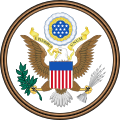Active parties
Major parties
| Party | Year founded | Political position | Ideology | Ballot access | Membership (as of December 2025 [update] )[ citation needed ] | Presidential vote (2024) | Legislators (federal and state) | |||||
|---|---|---|---|---|---|---|---|---|---|---|---|---|
| Electoral | Popular [4] | Senators [5] | Representatives | State legislators [6] | ||||||||
 | Republican Party (R) (GOP) | 1854 | Right-wing | Right-wing populism [a] Conservatism | 50 / 50 + DC | 38,166,633 | 312 / 538 | 77,302,580 (49.8%) | 53 / 100 | 219 / 435 | 4,031 / 7,383 | |
 | Democratic Party (D) | 1828 | Center to center-left | Liberalism | 50 / 50 + DC | 45,069,950 | 226 / 538 | 75,017,613 (48.3%) | 47 / 100 [A] | 214 / 435 | 3,271 / 7,383 | |
Third parties
Represented in state legislatures
The following third parties have members in state legislatures affiliated with them.
| Party | Year founded | Political position | Ideology | Ballot access | Membership (as of August 21,2025 [update] ) | State legislators | |
|---|---|---|---|---|---|---|---|
| Vermont Progressive Party | 1993 | Left-wing | Progressivism [7] Democratic socialism [7] | Vermont | Unknown | 5 / 7,383 [8] | |
| Forward Party (FWD) | 2022 | Center | 5 / 50 [9] | 4,806 [10] | 1 / 7,383 [11] | ||
Represented in the Puerto Rican Legislature
The following parties are represented in the Puerto Rican Legislature.
| Party | Year founded | Political position | Ideology | President | Gubernatorial vote [12] | Senators [13] | Representatives [13] | Mayors [14] | |
|---|---|---|---|---|---|---|---|---|---|
| New Progressive Party Partido Nuevo Progresista (PNP) | 1967 [15] | Center to center-right | Puerto Rico statehood Centrism | Jenniffer González-Colón | 524,373 (41.22%) | 19 / 28 | 36 / 53 | 36 / 78 | |
| Popular Democratic Party Partido Popular Democrático (PPD) | 1938 [16] | Center | Pro-Commonwealth Centrism Liberalism Social liberalism Decentralism | Jesús Manuel Ortiz | 273,162 (21.47%) | 5 / 28 | 13 / 53 | 41 / 78 | |
| Puerto Rican Independence Party Partido Independentista Puertorriqueño (PIP) | 1946 [15] | Center-left | Puerto Rico independence Progressivism Social democracy Democratic socialism | Juan Dalmau | 391,945 (30.81%) | 2 / 28 | 3 / 53 | 0 / 78 | |
| Project Dignity Proyecto Dignidad (PD) | 2019 | Center-right to right-wing | Christian democracy Anti-corruption Right-wing populism | Javier Jiménez | 81,251 (6.39%) | 1 / 28 | 1 / 53 | 1 / 78 | |
Represented in county legislatures
The following third parties have members in county legislatures affiliated with them.
| Party | Year founded | Political position | Ideology | Ballot access [17] [18] [19] | Presidential ballot access (2024) | Membership (as of August 21,2025 [update] ) [10] | Presidential vote (2024) [4] | County Legislators [20] | ||
|---|---|---|---|---|---|---|---|---|---|---|
 | Libertarian Party (LIB) | 1971 [21] | Center-right | Libertarianism [22] | 33 / 50 [23] [24] | 47 / 50 | 713,424 | 646,123 (0.418%) | 5 / 19,783 [25] | |
 | Constitution Party (CON) | 1992 [26] | Far-right | Paleoconservatism Christian right | 11 / 50 | 12 / 50 | 152,043 | 54,053 (0.035%) [b] | 2 / 19,783 [27] | |
 | Green Party (GRE) | 2001 [28] | Left-wing | Green politics Eco-socialism | 17 / 50 + DC | 37 / 50 | 262,370 | 813,066 (0.526%) | 1 / 19,783 [29] | |
Other parties with ballot access
The following third parties have ballot access in at least one state and are not represented in a national office, state/territorial legislature or county office. [17]
Multi-state
The following third parties are multi-state organizations—political parties which are active in more than one state—which have ballot access in one or more states.
Single-state/single-territory
The following third parties have ballot access in only one state and are only active in that state.
Active parties without ballot access
The following parties have been active in the past 4 years, but as of December 2021, did not have official ballot access in any state. [17]




